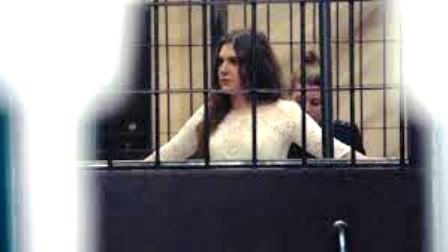


Anna Shisova: The New Greatness Case

One of my Russian friends wrote this to me not long ago: “A few days ago…Two women and their five children aged 7 to 11 were detained at the Ukrainian Embassy in Moscow yesterday. The children drew a poster “No War” and went with it. All of them were detained by the police. At first they were kept in a paddy wagon and then they were brought to the Presnenskoye police department. They were going to leave everyone at the station but then children and their mothers were released. Now parents are waiting for a court, fines and are afraid of deprivation of parental rights, they are looking for a human rights lawyer…”.
Surprised? No, I guess not, if you follow the reports coming from Russia. I used to go to Russia for film events and I know a lot of filmmakers, friends with whom I have talked about Life that passes while you are not busy doing something else than making films. Always being careful not to get into trouble when demonstrations take place. As Anna Shisova, the director of “The New Greatness Case” chosen for this Human Rights Day said in an interview: “For 10 or 20 years, the legal system in Russia has drifted in a totalitarian direction. We have many new laws. One of those laws says that if you say something bad against authority, you can be put in jail. Another law punishes extremist organizations, which means you are guilty if you say something against authority within a group.”
Words I have heard again and again when visiting St. Petersburg or Moscow. Often said with a twist of irony making fun of the regime and its leaders.
After February 24 2022 I have not travelled to Russia – and many filmmakers have left the country. The brutality has grown, demonstrators are knocked down and imprisoned. And the brutality in the war against Ukraine is indescribable. There is no need for irony – there is a need for constant good journalism AND documentaries like “The New Greatness Case”.
The film: Anya Pavlikova. 17 years old. She is in a court room behind the terrible glass room, we know so well from films about and news from Russia. Her parents sit in front of the glass room. The camera catches the nervous face of Anya , she seems to be on the edge of a breakdown. Fear! A judge enters the room and reads out the verdict: Anya is sentenced to 3 years of prison for her participation in a group of youngsters called “The New Greatness”… The beginning of a superb film.
Anna Shisova’s documentary is what a documentary should be: It documents and it interprets, it asks for reflection, it has a strong emotional impact on the audience. It tells the story of youngsters, who were chatting on the internet discussing all kind of matters including social and political. And it stays with the parents and makes a gripping portrait of the mother.
We know all that, what we did not know, at least that goes for me, is the skills with which the regime works with informers, who – as the film shows so well – infiltrated the youngsters, invited them to have their own “office” and pushed them to go for demonstrations with leaflets. Until they were arrested for wanting to go against and overthrow the government etc. Anya was one of them caught by the surveillance cameras set up by the secret service people. In a room that comes back again and again with the main informer in the picture. Absurd!
Contrary to many other films on opposition from Russia, like the ones on Navalny, Boris Nemtsov, Anna Politkovskaya, “The New Greatness Case” goes with Anya to her family, especially to her mother who turns fear into a hunger strike and herself into one of the many political activists, we hear too little about.
The film has been characterized as “a chilling portrait of the intensified crackdown on dissent and free expression in Putin’s Russia” (Sheffield DocFest). True!
Below is the link to the UN declaration of Human Rights.
Read the paragraphs and tick the ones you find relevant for a discussion after the film screening. Quite a lot I would say!
https://www.ohchr.org/en/human-rights/universal-declaration/translations/english